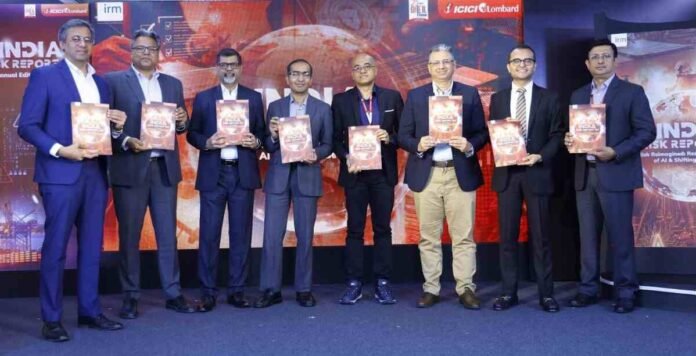Chandigarh, November 17, 2025: ICICI Lombard and the Institute of Risk Management (IRM) – India Affiliate have released the 3rd edition of the India Risk Report 2025, offering a deep dive into how technological transformation and global geopolitical shifts are reshaping India’s enterprise risk landscape. As India progresses toward the Viksit Bharat 2047 vision, the report highlights the urgent need for organizations to strengthen governance, risk culture, and digital preparedness to build long-term resilience.
India’s Risk Landscape: Technology & Geopolitics Take Center Stage
The 2025 report captures how Indian enterprises are responding to an increasingly volatile environment shaped by:
-
Rapid technological advancement
-
Intensifying cyber threats
-
Geopolitical realignments
-
Evolving legal and regulatory frameworks
The study is based on the IRM India – ICICI Lombard Enterprise Risk Perception Survey 2025 (ERPS-2025) conducted over two months, targeting 650 organizations and receiving 250+ responses. CXOs (55%) and senior leaders (35%) form the majority of respondents.
Covering 12 factors of risk maturity—including risk identification, implementation of controls, insurance strategy, and risk culture—the report provides a holistic view of how Indian companies perceive, prioritize, and prepare for emerging risks.
Top Insights and Trends from the India Risk Report 2025
1. Risk Perceptions: Cyber & Technology Risks Dominate
-
Cyber Risk remains the top short-term risk for the third year in a row.
-
Legal/Regulatory, Talent, and Macroeconomic risks follow.
-
In the long term, Cyber and Technology Risks continue to lead.
-
Trade wars, supply chain shifts, and geopolitical realignment emerge as growing concerns for 2025.
2. Risk Process Maturity: Strategy Exists, Execution Gaps Persist
-
Preparedness levels for top risks:
-
Technology Risks – 71%
-
Cyber Risks – 65%
-
Talent Risks – 64%
-
-
Over 20% of organizations lack controls or insurance for key risk categories.
-
While risk identification processes are strong, consistent implementation across departments remains a challenge.
3. Risk Culture: A Critical Gap in Enterprise Resilience
Despite improvements, risk culture maturity lags behind process maturity.
-
Only 12.3% of organizations demonstrate both strong culture and process maturity.
-
Limited initiatives exist for formal culture assessments.
-
Sharing learnings from near-misses and risk incidents is not yet standardized.
This gap emphasizes the need for leadership-driven accountability and cross-functional collaboration.
4. Preparedness Across Sectors
-
High readiness for traditional risks:
-
Cyber (93%)
-
Fire & Explosions (95%)
-
-
Significant gaps observed in:
-
Trade risk mitigation
-
Climate and environmental risk strategies
-
Macroeconomic planning
-
-
36% of respondents do not evaluate the cost of insuring their risks.
5. Sector-Wise and Enterprise-Scale Insights
Risk priorities vary significantly by industry:
-
BFSI, IT Services, Logistics: Cyber threats dominate
-
Manufacturing, Construction, Pharma: Supply chain and business interruption risks
-
Energy & Oil: Geopolitical and civil strife concerns
-
Large enterprises: Trade wars and global realignment
-
Startups: Technology and geopolitical risks top the list
These insights showcase how India’s diverse industry structure shapes risk readiness.
6. Turning Risks into Opportunities
Organizations are increasingly viewing risks as pathways to innovation:
-
75–85% see technology adoption as a competitive advantage
-
60–80% believe trade and macroeconomic shifts open new market opportunities
-
Talent availability and operational resilience are emerging as differentiators
Forward-looking enterprises are converting uncertainty into strategic growth.
Expert Insights from ICICI Lombard and IRM India
Sandeep Goradia, Chief Corporate Solutions, International & Bancassurance, ICICI Lombard:
“India’s evolving risk culture reflects growing economic maturity. Organizations today view cyber threats, economic uncertainties, and global realignments not just as risks, but as strategic growth accelerators. This partnership with IRM India helps businesses better understand and act on the changing risk environment.”
Hersh Shah, CEO, IRM India Affiliate:
“Our 2025 report highlights how organizations can build next-generation risk cultures—powered by data, anchored in ethics, and driven by human intelligence. The companies that thrive will be those that treat risk as intelligence and resilience as innovation.”
Key Takeaways from the India Risk Report 2025
1. Process & Culture Maturity Must Strengthen Together
Strong processes alone are not enough—organizations must embed risk awareness, uniform implementation, and insurance strategies across all functions.
2. Leadership is Central to Building a Resilient Risk Culture
Risk ownership must start from the top. Accountability, knowledge-sharing, and ethical governance are crucial to navigating disruptions.
3. Strategic Risk Preparedness Remains Essential
Enterprises must adopt forward-looking risk strategies that integrate early detection, scenario planning, and agile decision-making.
4. Risks Are Becoming Catalysts for Growth
Technology transformation, market shifts, and operational resilience are being leveraged as competitive advantages.
Methodology
The 3rd India Risk Report 2025 is built on a multi-layered research approach:
-
227 respondents across risk, finance, operations, and strategy
-
10+ expert columns from risk and business leaders
-
In-depth interviews with ICICI Lombard’s top underwriters
-
Secondary research aligned with global benchmarking and best practices
The goal: To help Indian enterprises evaluate their risk maturity, identify culture gaps, and adopt actionable strategies to strengthen resilience.


